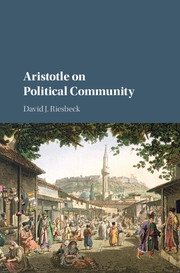Aristotle on Political Community
Aristotle's claims that 'man is a political animal' and that political community 'exists for the sake of living well' have frequently been celebrated by thinkers of divergent political persuasions. The details of his political philosophy, however, have often been regarded as outmoded, contradictory, or pernicious. This book takes on the major problems that arise in attempting to understand how the central pieces of Aristotle's political thought fit together: can a conception of politics that seems fundamentally inclusive and egalitarian be reconciled with a vision of justice that seems uncompromisingly hierarchical and authoritarian? Riesbeck argues that Aristotle's ideas about the distinctive nature and value of political community, political authority, and political participation are coherent and consistent with his aristocratic standards of justice. The result is a theory that, while not free of problems, remains a potentially fruitful resource for contemporary thinking about the persistent problems of political life.
- Develops and defends a distinctive interpretation of Aristotle's view of the nature and value of political community
- Seeks to understand Aristotle on his own terms while deploying the conceptual and argumentative tools of contemporary analytic history of philosophy
- Presents an interpretation of Aristotle that transcends recent debates among liberal, communitarian and republican-inspired readings
Product details
August 2016Hardback
9781107107021
332 pages
235 × 158 × 21 mm
0.59kg
Available
Table of Contents
- Introduction: community and exclusion
- 1. Paradoxes of monarchy
- 2. Community, friendship, and justice
- 3. From the household to the city
- 4. Rule and justice in the household and the city
- 5. Citizenship, constitutions, and political justice
- 6. Kingship as political rule and political community
- Conclusion: ruling and being ruled.



